5 英汉转换法
英译汉词类转换法

(三)adjectives converted into Chinese verbs . 1.adjectives derivated from verbs can be converted into Chinese verbs . I am rather doubtful about his real motive for doing this .我颇怀疑他做此事的动机。 2.The English adjective words indicating intuition ,feelings,desires and other psychological states can be generally translated into the verbs of Chinese,such as certain ,careful, doubtful ,cautious, angry,sure ,grateful and so on .
2.Nouns expressing action converted into verbs.
(1) He was accused of neglect of his duties. 他被指控玩忽职守。 (2) A study of the letter leaves us in no doubt as to the motives behind it. 研究一下那封信,就使我们毫丌怀疑该信是 别有用心的。
into adjectives adverbs
verbs
Chinese nouns converted Parts of speech English into Chinese adjectives converted into converted into adjectives adverbs pronouns nouns
2013翻译转译法

英译汉翻译技巧:转换法转换法指翻译过程中为了使译文符合目标语的表述方式、方法和习惯而对原句中的词类、句型和语态等进行转换。
具体的说,就是在词性方面,把名词转换为代词、形容词、动词;把动词转换成名词、形容词、副词、介词;把形容词转换成副词和短语。
在句子成分方面,把主语变成状语、定语、宾语、表语;把谓语变成主语、定语、表语;把定语变成状语、主语;把宾语变成主语。
在句型方面,把并列句变成复合句,把复合句变成并列句,把状语从句变成定语从句。
在语态方面,可以把主动语态变为被动语态。
(一)转译成动词1. 名词转译为动词The very sight of it makes me nervous一看到他,我就感到紧张。
A careful study of the original text will give you a better translation.仔细研究原文,你会翻译得更好。
He is a good singer.他唱歌唱得好。
Too much exposure to TV programs will do great harm to the eyesight of children. 孩子们看电视过多会大大地损坏视力。
(名词转动词)Too little brushing and too many sweets can cause tooth decay, sometimes very seriously.极少刷牙和吃太多的糖果会导致蛀牙,有时会非常严重。
2. 形容词转译成动词常见的有:与思维和知觉相关的形容词:aware, conscious, certain, sure, ignorant(无知的), alert等;与情感相关的形容词:glad, pleased, cautious, careful, angry, happy, excited, confident, thankful, grateful, concerned, eager, afraid, doubtful, sorry等;I am anxious about his health.我担心他的身体健康。
翻译转换法(亦称“转译”)
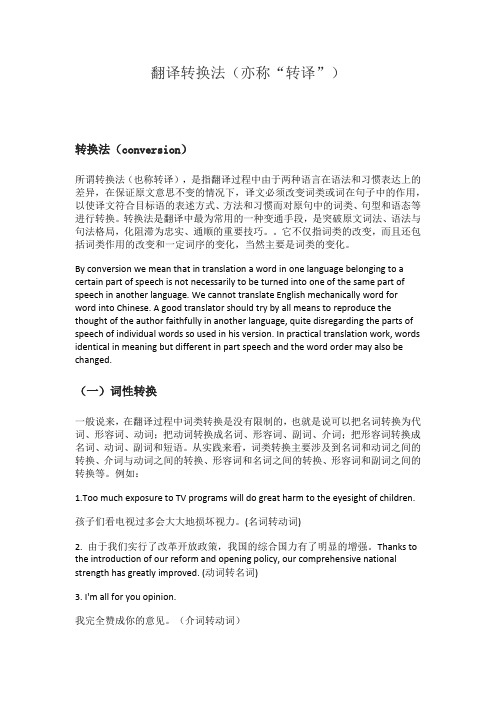
翻译转换法(亦称“转译”)转换法(conversion)所谓转换法(也称转译),是指翻译过程中由于两种语言在语法和习惯表达上的差异,在保证原文意思不变的情况下,译文必须改变词类或词在句子中的作用,以使译文符合目标语的表述方式、方法和习惯而对原句中的词类、句型和语态等进行转换。
转换法是翻译中最为常用的一种变通手段,是突破原文词法、语法与句法格局,化阻滞为忠实、通顺的重要技巧。
它不仅指词类的改变,而且还包括词类作用的改变和一定词序的变化,当然主要是词类的变化。
By conversion we mean that in translation a word in one language belonging to a certain part of speech is not necessarily to be turned into one of the same part of speech in another language. We cannot translate English mechanically word for word into Chinese. A good translator should try by all means to reproduce the thought of the author faithfully in another language, quite disregarding the parts of speech of individual words so used in his version. In practical translation work, words identical in meaning but different in part speech and the word order may also be changed.(一)词性转换一般说来,在翻译过程中词类转换是没有限制的,也就是说可以把名词转换为代词、形容词、动词;把动词转换成名词、形容词、副词、介词;把形容词转换成名词、动词、副词和短语。
翻译转换法(亦称“转译”)

翻译转换法(亦称“转译”)转换法(conversion)所谓转换法(也称转译),是指翻译过程中由于两种语言在语法和习惯表达上的差异,在保证原文意思不变的情况下,译文必须改变词类或词在句子中的作用,以使译文符合目标语的表述方式、方法和习惯而对原句中的词类、句型和语态等进行转换。
转换法是翻译中最为常用的一种变通手段,是突破原文词法、语法与句法格局,化阻滞为忠实、通顺的重要技巧。
它不仅指词类的改变,而且还包括词类作用的改变和一定词序的变化,当然主要是词类的变化。
By conversion we mean that in translation a word in one language belonging to a certain part of speech is not necessarily to be turned into one of the same part of speech in another language. We cannot translate English mechanically word for word into Chinese. A good translator should try by all means to reproduce the thought of the author faithfully in another language, quite disregarding the parts of speech of individual words so used in his version. In practical translation work, words identical in meaning but different in part speech and the word order may also be changed.(一)词性转换一般说来,在翻译过程中词类转换是没有限制的,也就是说可以把名词转换为代词、形容词、动词;把动词转换成名词、形容词、副词、介词;把形容词转换成名词、动词、副词和短语。
常用英汉互译技巧

八、插入法 指把难以处理的句子成分用破折号、括号或前后逗号插入译句 中。这种方法主要用于笔译中。偶尔也用于口译中,即用同位 语、插入语或定语从句来处理一些解释性成分。
如:如果说宣布收回香港就会像夫人说的“带来灾难性的影 响”,那我们将勇敢地面对这个灾难,做出决策。 If the announcement of the recovery of Hong Kong would bring about, as Madam put it, “disastrous effects,” we will face that disaster squarely and make a new policy decision.
常用英汉互译技巧
五、正译法和反译法
这两种方法通常用于汉译英,偶尔也用于英译汉。所谓正译,是指把句子 按照与汉语相同的语序或表达方式译成英语。所谓反译则是指把句子按照 与汉语相反的语序或表达方式译成英语。正译与反译常常具有同义的效果, 但反译往往更符合英语的思维方式和表达习惯。因此比较地道 。
例1. 你可以从因特网上获得这一信息。 You can obtain this information on the Internet. (正译) This information is accessible/available on the Internet. (反译) 例2. 他突然想到了一个新主意。 Suddenly he had a new idea. (正译) He suddenly thought out a new idea. (正译) A new idea suddenly occurred to/struck him. (反译)
常用英汉互译技巧
三、转换法 例1. Too much exposure to TV programs will do great harm to the eyesight of children. 孩子们看电视过多会大大地损坏视力。(名词转动词) 例2. 由于我们实行了改革开放政策,我国的综合国力有了明显 的增强。 Thanks to the introduction of our reform and opening policy, our comprehensive national strength has greatly improved. (动 词转名词) 例3. 时间不早了,我们回去吧! We don’t have much time left. Let’s go back. (句型转换)
词类转换翻译法
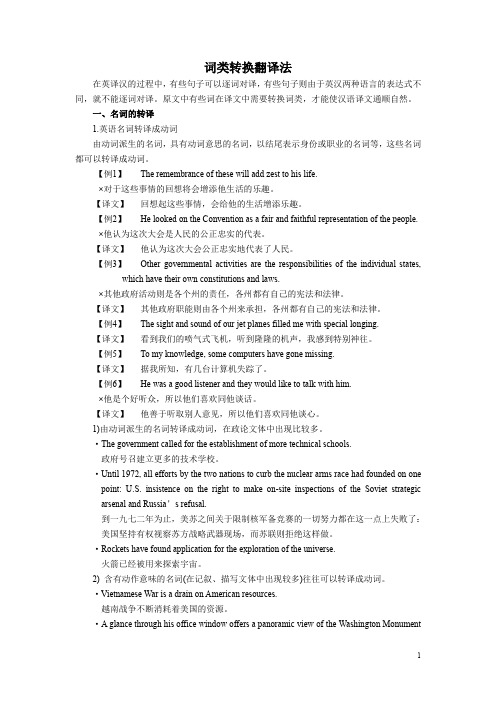
词类转换翻译法在英译汉的过程中,有些句子可以逐词对译,有些句子则由于英汉两种语言的表达式不同,就不能逐词对译。
原文中有些词在译文中需要转换词类,才能使汉语译文通顺自然。
一、名词的转译1.英语名词转译成动词由动词派生的名词,具有动词意思的名词,以结尾表示身份或职业的名词等,这些名词都可以转译成动词。
【例1】The remembrance of these will add zest to his life.×对于这些事情的回想将会增添他生活的乐趣。
【译文】回想起这些事情,会给他的生活增添乐趣。
【例2】He looked on the Convention as a fair and faithful representation of the people.×他认为这次大会是人民的公正忠实的代表。
【译文】他认为这次大会公正忠实地代表了人民。
【例3】Other governmental activities are the responsibilities of the individual states, which have their own constitutions and laws.×其他政府活动则是各个州的责任,各州都有自己的宪法和法律。
【译文】其他政府职能则由各个州来承担,各州都有自己的宪法和法律。
【例4】The sight and sound of our jet planes filled me with special longing.【译文】看到我们的喷气式飞机,听到隆隆的机声,我感到特别神往。
【例5】To my knowledge, some computers have gone missing.【译文】据我所知,有几台计算机失踪了。
【例6】He was a good listener and they would like to talk with him.×他是个好听众,所以他们喜欢同他谈话。
连淑能《英译汉教程》Conversion(转换法)【圣才出品】
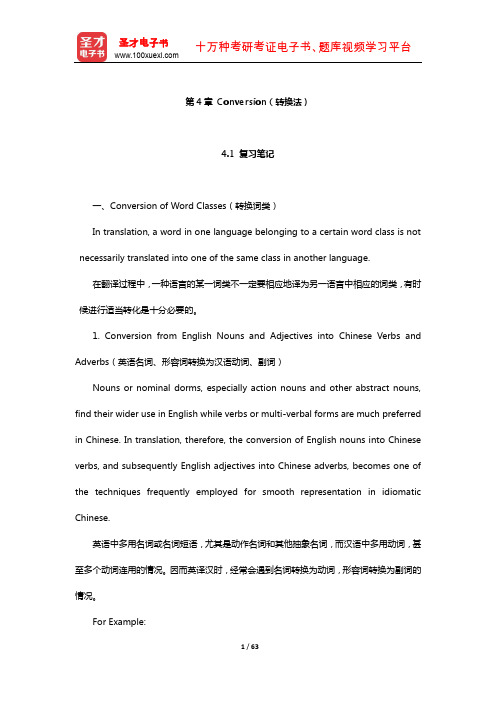
第4章Conversion(转换法)4.1 复习笔记一、Conversion of Word Classes(转换词类)In translation, a word in one language belonging to a certain word class is not necessarily translated into one of the same class in another language.在翻译过程中,一种语言的某一词类不一定要相应地译为另一语言中相应的词类,有时候进行适当转化是十分必要的。
1. Conversion from English Nouns and Adjectives into Chinese Verbs and Adverbs(英语名词、形容词转换为汉语动词、副词)Nouns or nominal dorms, especially action nouns and other abstract nouns, find their wider use in English while verbs or multi-verbal forms are much preferred in Chinese. In translation, therefore, the conversion of English nouns into Chinese verbs, and subsequently English adjectives into Chinese adverbs, becomes one of the techniques frequently employed for smooth representation in idiomatic Chinese.英语中多用名词或名词短语,尤其是动作名词和其他抽象名词,而汉语中多用动词,甚至多个动词连用的情况。
英译汉的翻译方法和技巧
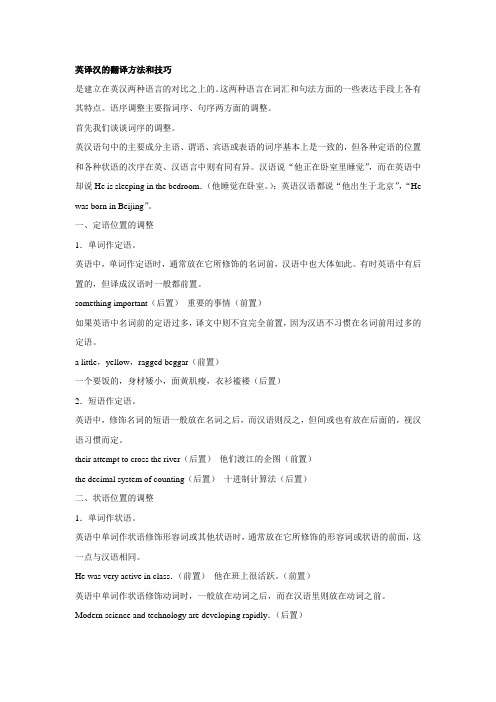
英译汉的翻译方法和技巧是建立在英汉两种语言的对比之上的。
这两种语言在词汇和句法方面的一些表达手段上各有其特点。
语序调整主要指词序、句序两方面的调整。
首先我们谈谈词序的调整。
英汉语句中的主要成分主语、谓语、宾语或表语的词序基本上是一致的,但各种定语的位置和各种状语的次序在英、汉语言中则有同有异。
汉语说“他正在卧室里睡觉”,而在英语中却说He is sleeping in the bedroom.(他睡觉在卧室。
);英语汉语都说“他出生于北京”,“He was born in Beijing”。
一、定语位置的调整1.单词作定语。
英语中,单词作定语时,通常放在它所修饰的名词前,汉语中也大体如此。
有时英语中有后置的,但译成汉语时一般都前置。
something important(后置)重要的事情(前置)如果英语中名词前的定语过多,译文中则不宜完全前置,因为汉语不习惯在名词前用过多的定语。
a little,yellow,ragged beggar(前置)一个要饭的,身材矮小,面黄肌瘦,衣衫褴褛(后置)2.短语作定语。
英语中,修饰名词的短语一般放在名词之后,而汉语则反之,但间或也有放在后面的,视汉语习惯而定。
their attempt to cross the river(后置)他们渡江的企图(前置)the decimal system of counting(后置)十进制计算法(后置)二、状语位置的调整1.单词作状语。
英语中单词作状语修饰形容词或其他状语时,通常放在它所修饰的形容词或状语的前面,这一点与汉语相同。
He was very active in class.(前置)他在班上很活跃。
(前置)英语中单词作状语修饰动词时,一般放在动词之后,而在汉语里则放在动词之前。
Modern science and technology are developing rapidly.(后置)现代科学技术正在迅速发展。
英汉互译八种技巧
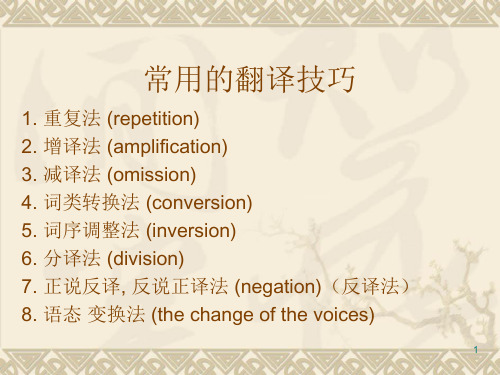
mathematics subtle; natural philosophy deep; moral grave; logic and rhetoric able to contend. ❖ 读史使人明智,读诗使人灵秀,数学使人周密,科 学使人深刻,伦理使人庄重,逻辑修辞之学使人善 辩。
thought and thought it over and over. 他有又上床去,左思右想,想个不停。
8
这种人闹什么东西呢?闹名誉,闹地位,闹出风头。 What are they after? They are after name, after position, and they want to cut smart figure.
of success. ❖ 不要害怕失败。失败是成功之母。 ❖ Translation from Chinese into English is not
so easy as that from English into Chinese. ❖ 汉译英不像英译汉那么容易。 ❖ A large family has its difficulties. ❖ 大(家庭)有大(家庭)的难处。
常用的翻译技巧
1. 重复法 (repetition) 2. 增译法 (amplification) 3. 减译法 (omission) 4. 词类转换法 (conversion) 5. 词序调整法 (inversion) 6. 分译法 (division) 7. 正说反译, 反说正译法 (negation)(反译法) 8. 语态 变换法 (the change of the voices)
英汉互译技巧
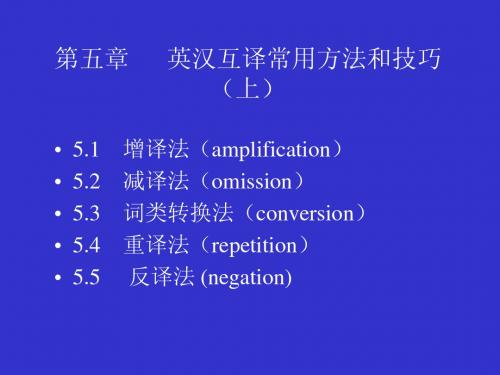
5.1.1 英译汉中的增词法
7. 概括性增词
e.g. • the United States, Russian, England and France 美俄英法四国 • militarily, politically and economically 军事、政治、经济等各方面 • The Americans and the Japanese conducted a completely secret exchange of messages. 美日双方在完全保密的情况下互换了信件。 • The thesis summed up the new achievements made in electronic computers, artificial satellites and rockets. 论文总结了电子计算机、人造卫星和火箭三方面的新 成就。
5.1.1 英译汉中的增词法
bandits / animals 匪邦(加“类、种、界”等) directions / the Americas 南北美洲(具体到子项) hills / rivers 一座座山(量词重叠)
• The lion is the king of animals. • The mountains began to throw their long blue shadows over the valley. • The nations of America are equally sovereign and independent with those of Europe.
第五章
英汉互译常用方法和技巧 (上)
• • • • •
5.1 5.2 5.3 5.4 5.5
增译法(amplification) 减译法(omission) 词类转换法(conversion) 重译法(repetition) 反译法 (negation)
第五章 语态转换(英译汉)
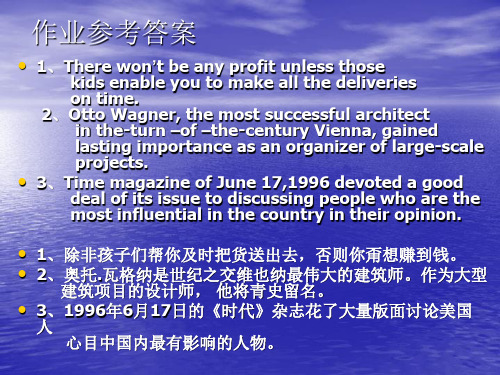
• 1、There won’t be any profit unless those
kids enable you to make all the deliveries on time. 2、Otto Wagner, the most successful architect in the-turn –of –the-century Vienna, gained lasting importance as an organizer of large-scale projects. 3、Time magazine of June 17,1996 devoted a good deal of its issue to discussing people who are the most influential in the country in their opinion.
•
contributed by Canada, Japan, the Netherlands, the United Kingdom and the United States. 就基础教育而言,加拿大、日本、荷兰、英国和美国捐助 了三分之二以上。 (就基础教育而言,三分之二以上是由加拿大、日本、荷 兰、英国和美国捐助。)
• 4、“泛指主语+动词”的结构
• 原句中没有具体的施事者,但根据上下文可以推
断其施事者是泛指的人。英译汉时可以用“人 们”、“有人”、“大家”或“我们”等泛指主 语作主语。
• 例:
It would be astonishing if that loss were not keenly felt. 如果没人觉察到损失就太奇怪了。 例: Although little is known about how hypnosis works, it has been made use of in medical treatment. 虽然人们对催眠术知之甚少,但该技术已用于临床治 疗。 例: Her plans for a movie career are believed to have all been merely a pipe dream. 有人认为她当电影明星的计划不过是黄粱美梦。
翻译技巧--转换
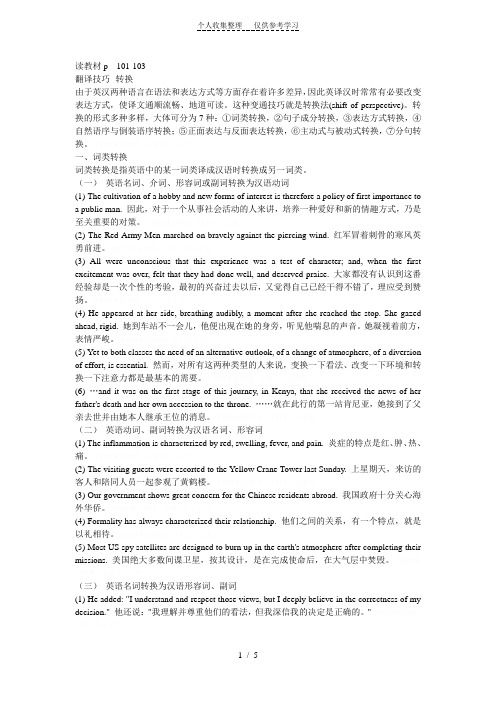
读教材p 101-103翻译技巧--转换由于英汉两种语言在语法和表达方式等方面存在着许多差异,因此英译汉时常常有必要改变表达方式,使译文通顺流畅、地道可读。
这种变通技巧就是转换法(shift of perspective)。
转换的形式多种多样,大体可分为7种:①词类转换,②句子成分转换,③表达方式转换,④自然语序与倒装语序转换;⑤正面表达与反面表达转换,⑥主动式与被动式转换,⑦分句转换。
一、词类转换词类转换是指英语中的某一词类译成汉语时转换成另一词类。
(一)英语名词、介词、形容词或副词转换为汉语动词(1) The cultivation of a hobby and new forms of interest is therefore a policy of first importance toa public man. 因此,对于一个从事社会活动的人来讲,培养一种爱好和新的情趣方式,乃是至关重要的对策。
(2) The Red Army Men marched on bravely against the piercing wind. 红军冒着刺骨的寒风英勇前进。
(3) All were unconscious that this experience was a test of character; and, when the first excitement was over, felt that they had done well, and deserved praise. 大家都没有认识到这番经验却是一次个性的考验,最初的兴奋过去以后,又觉得自己已经干得不错了,理应受到赞扬。
(4) He appeared at her side, breathing audibly, a moment after she reached the stop. She gazed ahead, rigid. 她到车站不一会儿,他便出现在她的身旁,听见他喘息的声音。
英汉翻译中的转换法综述

英汉翻译中的转换法综述【摘要】翻译就是从语义到语体在译语中用最贴切,最自然的对等语再现源语的信息。
由于英汉两种语言在语法或表达习惯上存在巨大差异, 在英汉翻译的过程中, 往往需要改变原文的词类或句子成分。
作为英汉翻译中常用的翻译技巧,转换法可以使译文自然、流畅、准确,既传达原意又符合汉语的表达习惯。
【abstract】Translating consists in reproducing in the receptor l anguage the closest natural equivalent of the source language message, firstly in terms of meaning ,and secondly in terms of style.Due to the great differences between English and Chinese in gramm ar and expression style, translation need to adopt the approa ches of changing the word classes and sentence components in English-Chinese (E-C) translation.conversion ,As a frequentl y-used translation technique,makestranslators to achieve a natu ral, fluent and accurate translation that not only conveys t he original text’s information but also fits the idiomatic u sage of Chinese.【关键词】英汉翻译词类句子成分转换[key words]Englishing-chinesetranslation,word classes,sentence c omponents ,conversion词类转换是常用的英汉翻译技巧。
英汉转换翻译

Metals can be welded by means of heat produced by a current.
金属可以用电流产生的热来进行焊接。
3 形容词转译成动词(adj.---v.)
Doctors have said that they are not sure they can save his life.
In those years the republicans were in. 那些年是共和党执政。
Double windows were fixed to keep the cold out. 安装双层窗御寒。 动名词转译成动词(gerund---v.) The origin of this particular culture is far from clearing. 这种奇特的文化根源远没有弄清楚。
登山运动员第三天建立了另一座营地,当时高度表的读 数为6500英尺。
Harry aims to become a computer expert. 哈里的目标是成为计算机专家。 Your work is characterized by lack of attention to detail. 你工作的毛病是不注意细节。(粗心大意) The machine weighs about five hundred kilograms. 这台机器的重量是500公斤。
*The youths always dream fondly of their future. 年轻人对前途总是怀有美好的梦想。
*Independent observers have commented favorably on the achievements you have made in this direction.
5 英汉转换法

难predicates • Examples (见课本 P116)
• 1) The following provides a brief account of how the human body is built.
the years to come. • 今后,中国将会变得更加强大,这是确信无疑的/必然
的。
• 5. v. -- n. • Examples (见课本 P113)
• 1) The earth on which we live is shaped like a ball. • 我们所居住的地球,其形状像个球体。 • 2) The instrument is characterized by its compactness and
insulator than air. • 橡胶的介电性比空气好,但是绝缘性比空气差。 • 或:与空气相比,橡胶的介电性较好,绝缘性较差。
• 4. subjects -- attributes • Examples (见课本 P115)
• 1) The development of scientific research in China is characterized by the integration of theory with practice.
• 2. adj. -- v. • Examples (见课本 P111)
• 1) She is familiar with English. • 她通晓英语。
• 2) I am out fifty dollars. • 我损失了50美元。
• 3) These are the correct ideas characteristic of the advanced class.
英汉翻译之转换法

反说正译: 经典译例
As I approve of a youth that has something of the old man in him, so I am no less pleased with an old man that has something of the youth. He that followed this rule may be old in body, but can never be so in mind. 我赞赏具有老人成熟风度的青年,而我 同样称颂具有青年气息的老人。这样的人, 只有躯体会衰老,可思想永远年轻活跃。
A truly elegant taste is generally accompanied with excellence of heart. To whom nothing is given, of him can nothing be required. The best work is done the way ants do things--by tiny, tireless and regular additions.
有为数不多的英语主动句却往往译成 汉语“被”字句。
They all succumbed to temptation. The jeweler's was robbed last night, and the Reagans are under suspicious.
三,正反转换: 1)正说反译: It is already five years since I smoked. Her conduct is above reproach. Politeness is not always the sign of wisdom, but the want of it always leaves room for the suspicion of folly. Mattie’s hand was underneath, and Etan kept his clasped on it a moment longer than necessary (握的比必要的时间长了一会儿。)?.
英语翻译转换法
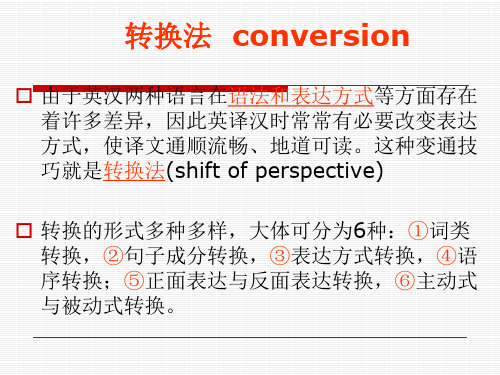
二、 句子成分转换
转换句子成分是使译文符合译语表达习惯的一 种手段,因为英汉两种语言句子转换有差异:英 语中名词用的频繁,经常出现主系表结构;而汉 语中动词、副词用得多,导致主+谓+宾成为基 本句型。 e.g The paper is the introduction of translation skills. 本文介绍了各种翻译技巧。
2.定语译为谓语
1.Each time he was the first man to arrive and the last to leave. 每次他总是第一个来,最后一个走。 2.Its limited thickness and youthful age are other discoveries. 它厚度有限,年代短,这是另外两个发现。
4.介词宾语译为主语
1.He is strong of will. 他的意志很坚强。 2.With the introduction of the new method,the products decreased in cost. 引进了新方法,产品的成本降低了。
二、转换为汉语谓语
1.主语译为谓语 The statement of the Commercial Invoice and the Combined Invoice is as follows. 商业发票和联合票可表述如下。
五)正面表达与反面表达转换
什么是正面表达?什么是反面表达? 由于思维方式的不同,英语中有些从正面表 达的东西在汉语中习惯从反面来表达;而有 些从反面来表达的东西在汉语中则习惯从正 面来表达。因此,英译汉时常常有必要进行 转换。这就是通常所说的―正说反译、反说 正译‖法。
(一)英语正面表达转换为汉语反面表达
英汉翻译技巧第五章 英汉翻译中词类的转换[精]
![英汉翻译技巧第五章 英汉翻译中词类的转换[精]](https://img.taocdn.com/s3/m/6289a0e676a20029bd642d39.png)
词类的转换是英译汉中很重要的一种翻译技巧。词类转换就是在翻译过程
中为了准确自然表达源出语的精神,而在译入语表达中改变词汇单位词类,以 通顺的语言忠实地表达原文的思想内容,进行有效的翻译。不同的语言,其词 类类型与结构也不相同。译者在翻译过程中按照源出语的方式准确理解原文的 逻辑关系,按照译入语的语言形式自然地表达原义。正确运用这一技巧,可以帮 助我们获得弥补英汉两种语言现象和思维表达方式上的差异。词类转换在英译 汉时一般有英语名词、介词、形容词或副词等转换为汉语动词;英语动词、副 词转换为汉语名词;形容词、英语名词转换为汉语形容词、汉语副词;英语形 容词转换为汉语名词、副词等。惟有如此,才能在忠实原文的前提下,摆脱原 文形式的束缚,使自己的译文通顺流畅,更符合译文的语言规范。
我发现了郊外一处叫斯丹尼斯劳的美丽地方。这地方就像世外桃源。 青翠欲滴、曲径通幽的山林中柔风轻轻吹拂着树枝。
Other men, also looking for gold, had reached the Stanislau
hills of California many years before I did. They had built a town in
英语中的某些名词、形容词、介词、副词,翻译时可转译成汉语中 的动词。英语是以综合型为主的语言,它的一个显著特征是词缀丰富。这 使得有些动词和形容词很容易派生为名词,从而使名词化现象非常常见 (nominalization)。英译汉时,适当多考虑使用动词,以静转动,反之 亦然。试看以下几个句子:
(4) “...and that government of the people,by the people,for the people ...”
两种语言的表达方式不同,原文中有的词在译文中需要转换词类, 才能使 汉语译文通顺自然。本例中出现的形容词weekly在译文里 转换为了副词“每周”。
- 1、下载文档前请自行甄别文档内容的完整性,平台不提供额外的编辑、内容补充、找答案等附加服务。
- 2、"仅部分预览"的文档,不可在线预览部分如存在完整性等问题,可反馈申请退款(可完整预览的文档不适用该条件!)。
- 3、如文档侵犯您的权益,请联系客服反馈,我们会尽快为您处理(人工客服工作时间:9:00-18:30)。
mirror(平面镜) as the object is in front; it is also of equal size. • 物体在平面镜中的呈像与镜前实物离镜面的距离总是相 等的,二者大小也相等。
• 4. n. -- adj. • Examples (见课本 P112)
• 1) I have full assurance of the reliability of the information. • 我完全相信这条消息是可靠的。 • 或:我完全信赖这条消息的可靠性。(n.— n.) • 2) Investigation assured us of the soundness of the plan. • 通过调查,我们确信这项计划是合理的。 • 3) I can attest to(证明) the absolute truth of his statement. • 我可以证明他的陈述/话是绝对可信的。 • 4) It is a certainty that China will become even stronger in
(object -- object complement)
III. Conversion of impersonal subjects
• 1. impersonal subjects -- personal or other subjects • Examples (见课本 P118) • 1) My mind misgave(疑虑,担忧) me that my neglect had
• 以下/下文简要说明了人体是如何构造的。 • 或:以下/下文对人体构造进行了简要说明。
(object -- object) • 2) Explosions on the sun result in a great increase in
ultraviolet(紫外线) radiation. • 太阳发生的爆炸大大增加了紫外线辐射。 • 或:太阳发生的爆炸致使紫外线辐射急剧增强。
portability. • 这个仪器的特点是结构小巧、便携性强。 • 3) The electric current is defined as a stream of electrons
flowing through a conduct. • 电流的定义是流经导体的电子流。 • 4) He was apprenticed to a blacksmith(铁匠) when he was
• 4) There must be a clear recognition of the principles of equality between states.
• (我们)必须明确承认国与国之间平等的原则。
• 5) This discovery was the beginning of the science of aerostatics(航空学).
only ten years old. • 他十岁时,就去给铁匠当学徒了。
• 6. adv. -- n. • Examples (见课本 P114)
• 1) Sodium(钠) is very active chemically. • 钠的化学特性很活泼。 • 2) The device is shown schematically in Fig. 8. • schema n. 图表,图解 • schematic adj. a schematic diagram 示意图 • 这种装置的简图如图8所示。 • 3) Internally the earth consists of two parts, a core and a
• 利用煤和石油能够制造/生产出各种有用物质。 • 2) An idea came to him. • 他突然想到一个主意。 • 3) The poor were burdened with heavy taxes. • 重税压在穷人身上。 • 或:穷人肩负重税。
• 6. attributes -- predicates • Examples (见课本 P115)
• 3) There is a large amount of energy wasted due to friction. • 摩擦损耗了大量能源。 • 4) The water rushing down the pipe and hitting the
blades(叶片) sets the wheel turning. • 水顺着管子冲下去并撞击叶片,从而使水轮转动起来。
the years to come. • 今后,中国将会变得更加强大,这是确信无疑的/必然
的。
• 5. v. -- n. • Examples (见课本 P113)
• 1) The earth on which we live is shaped like a ball. • 我们所居住的地球,其形状像个球体。 • 2) The instrument is characterized by its compactness and
英汉翻译技巧之转换法
Conversion
CONTENTS
I. Conversion of word classes II. Conversion of sentence members III. Conversion of impersonal subjects
I. Conversion of word classes
• 这项发现开创了航空学这一门学科。
• 6) Such rocks are the most suitable underground-water reservoirs(水库,蓄水池).
• 这类岩石最适宜储存地下水。
• 7) This shop offers a large choice of hats and shoes. • 该商店提供大批鞋帽以供选购。
• characteristic of 特有的,表示…的特征 • 这些是代表先进阶级的正确思想。
• 3. prep. -- v. • Examples (见课本 P112)
• 1) In our view this meeting in Beijing contributes significantly towards that future.
• 我们认为,此次在北京的会见大大有助于实现这样的前 景。
• 2) She escorted the foreign guests round the sights of Guilin. • 她陪外宾游览桂林风景。 • 3) In his early days he abandoned medicine for literature. • 他早年弃医从文。
magnetic characteristics. • 很明显,各种物质/材料的磁特性差别很大。
• 3. predicatives -- subjects • Examples (见课本 P115)
• 1) The rotor(转子) is a well-designed structure. • 转子的结构设计得很好。 • 2) Rubber is a better dielectric( 电 介 质 ) but a poorer
• 2. adj. -- v. • Examples (见课本 P111)
• 1) She is familiar with English. • 她通晓英语。
• 2) I am out fifty dollars. • 我损失了50美元。
• 3) These are the correct ideas characteristic of the advanced class.
is unimaginably large. • 在我们所能看到的任何物体中,其分子数量都多得令人
难以想象。
• 8. objects -- predicates • Examples (见课本 P116)
• 1) The following provides a brief account of how the human body is built.
insulator than air. • 橡胶的介电性比空气好,但是绝缘性比空气差。 • 或:与空气相比,橡胶的介电性较好,绝缘性较差。
• 4. subjects -- attributes • Examples (见课本 P115)
• 1) The development of scientific research in China is characterized by the integration of theory with practice.
• 1. n. & adj. – v. & adv. • English: adj. + n. • Chinese: adv. + v. • Examples (见课本 P103)
• 1) No violation of this principle can be tolerated. • 决对不允许违反这个原则。 • 2) I have no intention of wearying you with this matter. • 我无意让这件事使你烦心的。 • 3) We are enemies of all aggressive wars. • 我们反对一切侵略战争。
• 在中国,科研发展的特点是理论联系实际。 • 2) Warm-blooded animals have a constant body temperature. • 热血动物的体温恒定。
